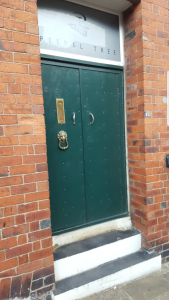Making a Home: A Profile on Peepal Tree Press
I had never left home before. Aside from holidays, I hadn’t lived anywhere that wasn’t Dundee. Last summer, I did at the age of twenty-five what most people do at eighteen; I moved to Leeds, into student accommodation for my work placement. I was forced to make a home for myself in an unfamiliar place.
In the weeks that followed, I learned what it means to make a home elsewhere, and to think about the home that I had left behind. In relocating, I navigated the cityscape, made supports from rituals and objects of homeliness that I could lean on, and in doing these things, carving out a space of belonging for myself. My reflections on the notion of home deepened, and became more complex and layered, and I started to think about home not simply as a material space but also an imaginative one.
 I started working for Peepal Tree Press that summer, a publisher styled as the ‘Home of the Best in Caribbean and Black British Writing’. The press is itself a transnational migrant. Born in Guyana at the hands of its founder and managing editor, Jeremy Poynting, and writer Rooplall Monar, Peepal Tree is now a leading publisher in Caribbean and Black British writing.
I started working for Peepal Tree Press that summer, a publisher styled as the ‘Home of the Best in Caribbean and Black British Writing’. The press is itself a transnational migrant. Born in Guyana at the hands of its founder and managing editor, Jeremy Poynting, and writer Rooplall Monar, Peepal Tree is now a leading publisher in Caribbean and Black British writing.
The independent press began life in 1986, ‘out of an awareness that the kind of people who used to be publishing Caribbean writing were not publishing very much at all.’[i] But whilst in Guyana, Jeremy, who was researching Indo-Caribbean writing at that time, found that there was good writing in the Caribbean that was not appearing in print. Jeremy published his friend Monar’s collection of short stories, Backdam People. This was the seed that would grow into Peepal Tree Press.
While the seed had its roots in Guyana, Jeremy grew the sapling in Leeds. Backdam People was printed and bound at the Thomas Danby College in Leeds simply to prove it could be done. Jeremy then took his small run of copies to the International Book Fair of Black, Radical and Third World Books, selling from a small table. It sold out, proving that Peepal Tree could grow in the UK.
From then, the press continued as ‘a serious but quite expensive hobby.’ In its first few years, it published one or two books per year, laying down the foundations for a larger more regular output. Over the last thirty-five years, from its early beginnings in Guyana, Peepal Tree Press has created a home for Caribbean and Black British writing. Not simply a literary home but one in terms of family, community and belonging.[ii]
 Peepal Tree’s office is situated on the side street of a residential area and looks more like a studio flat. You wouldn’t know there was a publishing house there, unless you were looking for it. The entrance is marked by an emerald green door above which holds a pane of glass bearing the company logo. Entering at street level, the space where Peepal Tree stores its books is not dissimilar to going into a garage. Heading up stairs to the first floor, the office space feels more like a living room than a place of work. To the right there is a small kitchenette and water closet. The rest of the space is given over to a sofa in the corner, a desk to one side, bookshelves, filing cabinets and drawers on another side. In the middle of the room is a large wooden table where Jeremy works. As the weeks went by in my placement, the office seemed to take on a relaxed vibe; working in the office felt less like work and more like having writing or reading sessions with friends.
Peepal Tree’s office is situated on the side street of a residential area and looks more like a studio flat. You wouldn’t know there was a publishing house there, unless you were looking for it. The entrance is marked by an emerald green door above which holds a pane of glass bearing the company logo. Entering at street level, the space where Peepal Tree stores its books is not dissimilar to going into a garage. Heading up stairs to the first floor, the office space feels more like a living room than a place of work. To the right there is a small kitchenette and water closet. The rest of the space is given over to a sofa in the corner, a desk to one side, bookshelves, filing cabinets and drawers on another side. In the middle of the room is a large wooden table where Jeremy works. As the weeks went by in my placement, the office seemed to take on a relaxed vibe; working in the office felt less like work and more like having writing or reading sessions with friends.
It is worth reflecting on why both Jeremy and Hannah Bannister, the Press’ operation manager, felt a need for an extended home for Caribbean and Black British writing. Certainly, a home so far away from the Caribbean in the UK seems counter intuitive. Jeremy and Hannah told me of the logistical issues attendant on getting books into the Caribbean―practical things like getting booksellers to sell books from other Caribbean nations and having a proper distribution system. In the six weeks that I spent there, I joined Jeremy at two local events to learn about the activities Peepal Tree is involved with outside of office hours. The first of these was a Post-Colonial Studies symposium hosted by New Voices in Post-Colonial Studies[iii] where Jeremy was presenting on ‘Why Peepal Tree Exists’. Jeremy explained the small reading population, lack of bookshops, funding and other factors that the Caribbean countries face. Thus while there is clearly good writing talent to be found in the region, the reading community is also somewhat fragmented. Harry Gouldbourne has also written about this in Caribbean Transnational Experience; he observes,
More than most diasporas, the Caribbean one refers to a highly fragmented graphical region which has little or no coherence at home or abroad […] the Caribbean abroad is not a singular but a very plural world or community, which looks outwards to different worlds.[iv]
Given such circumstances it might be useful to view Peepal Tree as an imagined community. But the atmosphere at its offices also offers a convivial, nurturing and collegiate space, and the office functioned as a converging point for everyone involved. The press’ writers, staff, relatives, visitors would all fetch up and be welcomed as a family member. And there was a personal touch to the way business was conducted.
There has always been the tendency for writers in the Caribbean to think, ‘I have to sell my books in a UK or American market’, Jeremy told me. People don’t seem to ‘think that they’re going to sell in a wider Caribbean market. It’s breaking down slightly now, but we’ve had about twenty years of battling insularity.’
The idea of publishing in the UK or US is appealing to Anglophone writers because those metropolitan centres are where there are sales generated. What attracts Caribbean and Black British writers to Peepal Tree is also a chance to move away from a perceived ‘insularity.’ Peepal Tree has embedded itself in the literary and cultural activities of the diasporas it publishes for and continues to battle this insularity in many ways, including holding its own literary events and being a key part of the Bocas Literary Festival in Trinidad
The idea to grow a press such as Peepal Tree came from New Beacon, the owner of which was a close friend of Jeremy’s. When talking about Peepal Tree’s beginnings, Jeremy has always acknowledged his bond with John La Rose and Sarah White as a major political, cultural and literary influence and subsequently in establishing Peepal Tree Press. From hearing Jeremy speak about La Rose, and reading his commemorative contributions in Foundations of a Movement a familiar theme emerges. Jeremy writes, ‘More than anything I gain from John a deepened awareness of the interconnectedness of the world, the linkages that made sense of what was happening in London, the Yorkshire coalfields, Port of Spain, Lagos, Soweto, New York.’[v] The concepts of ‘interconnectedness’ and ‘linkages’ serve to counter Caribbean’s insularity and fragmented nature.
This makes me ponder on how New Beacon’s history has impacted on Peepal Tree’s sense of making a home for its writers. In Brian Alleyne’s Radicals Against Race, an exploration of New Beacon’s activism, he mooted the idea of a ‘circle’ to represent a collective coming together to engage in political and cultural activities[vi], bringing together groups of people who were all motivated by the similar political, cultural and literary ideals. In reading about the formation of New Beacon and its ‘circle’, a few things were clear to me. Primarily, it was the result of different people—artists, writers, activists, such as the Caribbean Artists Movement, along with the La Rose and White’s wider political aspirations into which they embedded their literary and cultural activities.
Jeremy credits the New Beacon circle, as initiating the foundations of Peepal Tree. The International Book Fair of Black Radical and Third World Books, where Jeremy took Rooplal Monar’s Backdam People to sell, was organised by the New Beacon circle, and Jessica Huntley from Bogle L’Overture, another London-based black radical publisher. The fair, as Alleyne observes, galvanised teachers, small publishers, writers and artists all wanting change for a better society; it gave ‘the human relationships through which work and ideas were circulated.’[vii]
Publishing in this way is about ‘human relationships’. One of the most rewarding and stimulating parts of the work placement were the connections made with others, whether it was writers coming in or students also on work experience. It was a pleasure to share my experience with a student archivist, Rawan Mohamed from Manchester, who was working with Peepal Tree to archive all the material they had collated over the years—letters, contracts, manuscripts, photographs, old books. In speaking with her, I got another perspective of someone from outside the press looking in:
everything interlinks and is connected […] there’s a lot of linking, networking, friendship–everyone knows each other whether it’s mutually or personally. That’s what I’ve found to be very interesting, whether it be Derek Walcott, Jennifer Rahim or David Dabydeen or Jeremy [Poynting] himself. There are all these connections and that’s really interesting and that is part of the story of Peepal Tree.
Does the question of how one builds a literary home for writers start, like most homes with its people, with a family? These ‘human relationships’ that Alleyne speaks of are at the core of what Peepal Tree does. I probed Jeremy and Hannah further on creating a home for writing, and how they felt they achieved what they and so many others claim to be a home for Caribbean and Black British Writers.[viii] The answer is in the non-corporate way Peepal Tree functions:
HB: I think we completely lack a corporate structure or anything. Because we’ve just evolved, haven’t we?
JP: Yes, so in terms of any communication, it’s either to Hannah or to me, so that’s an immediate thing. Sometimes people are surprised when I pick the phone up. Anywhere else…
HB: You’re ready for three levels of people.
JP: So that’s part of it. Also, anyone who comes to Leeds gets put up in our house. People want to come here and see what goes on.
HB: And spending the majority of one’s life here tends to make it more homely.
There’s truly a personal touch to how Peepal Tree interacts with its writers. I remember the first time I shared the office with Jacob Ross, writer and Peepal Tree fiction editor. He climbed the steps up into the office with a warm smile on his face and his trademark black hat perched on his head. Followed by Hannah who had let him in, he strode over to Jeremy and they greeted each other as old friends. Throughout the week it was a real pleasure to sit in Jacob and Jeremy’s company as they shared, news, stories, opinions on writing. We made coffee, learned from and inspired each other. I remember fondly both men sharing their love of Jazz music together. A new CD had arrived in the post for Jeremy which they both listened to together, with the same passion as they did their writing. When I reflect on my time at Peepal Tree and think of it in the context of home, those are the moments that first come to mind.
Such recollections aren’t only anecdotal; during my time there everyone who climbed those stairs was treated as warmly. Each person was welcomed and offered as if being invited into a home—this publisher’s living room—and not an office. The same was true for one of Peepal Tree’s visiting writers, Shivanee Ramlochan, who had arrived from Trinidad and was speaking at an event in Leeds Central Library.
These intimate and familial relationships at Peepal Tree do not stop at the level of interpersonal interactions. It is also in the language of the press, how it talks about itself. In an effort to understand more about Peepal Tree from a business standpoint, I was given access to their business plans and application for Arts Council England funding. From a perusal of these, it was clear to see the level of humility and care that Peepal Tree have for its writers, and the Press have echoed my own and others’ sentiments with positive and inclusive descriptions of how they regard and present themselves: ‘We provide a welcoming home for Caribbean and Black British writing […] our writers regard Peepal Tree as a family open to multiple ideas about what being Black means.’
Peepal Tree’s complex understanding of what is signified by the term, ‘Black’ is also substantively and deliberately inclusive. While we might consider, rather reductively, Black to mean those from Caribbean or African nations, the Press’ extends what it names to the South Asian diaspora. Blackness as a cultural and ethnic identity is thus much more expansive. Giving an example of this Jeremy said:
In terms of Black British writing, we haven’t only published Caribbean writing. The people who tend to follow their work tend to be more internationalist in outlook. Someone like Seni [Seneviratne], if you ask Seni what her identity was, she would say she’s Black. She’s of that age where she embraced a Black identity. She doesn’t say she’s Sri Lankan or that she would appeal to Sri Lankans here.
I found this heterogeneous and diverse way of naming Blackness useful and appropriate for considering the writers on Peepal Tree’s list as members of a family too for it acknowledges both filiation, kinship and affiliation, and reinforces a sense of care for all members of this literary family. Peepal Tree also acts as ‘curator’ and ‘preserver’, suggesting also a publishing lineage or heritage, its literary ancestors so to speak in their Caribbean Classic Series. From its business plans, terms such as ‘development’, ‘engage’, ‘committed’ recur and I could see Peepal Tree’s desire to create something that continues to grow and evolve. The press’ very survival has relied on these attributes for its growth. It has embraced changed and moved with the times.
 If Peepal Tree and its writers are a family then what of Inscribe, its writer development program and publishing banner? Perhaps we can consider them as members who lived at home but moved out. They live elsewhere, do their own things but come home to visit regularly. Inscribe uses a series of workshops, events and professional advice to nurture unpublished writers. As a writer myself, I was keen to learn more about this branch of Peepal Tree but my time there did not include much contact with Inscribe. As a development program, Inscribe[ix] brings new members to the family, introducing them through its fiction and poetry anthologies such as Closure and Filigree. Some of the writers developed through Inscribe progress from chapbooks and anthologies eventually to books and collections of their own.
If Peepal Tree and its writers are a family then what of Inscribe, its writer development program and publishing banner? Perhaps we can consider them as members who lived at home but moved out. They live elsewhere, do their own things but come home to visit regularly. Inscribe uses a series of workshops, events and professional advice to nurture unpublished writers. As a writer myself, I was keen to learn more about this branch of Peepal Tree but my time there did not include much contact with Inscribe. As a development program, Inscribe[ix] brings new members to the family, introducing them through its fiction and poetry anthologies such as Closure and Filigree. Some of the writers developed through Inscribe progress from chapbooks and anthologies eventually to books and collections of their own.
As I finished my last day at Peepal Tree, Jeremy and I reflected on my six weeks there. We thanked each other for our time and the experience of working together. It was a short and very fast six weeks, but in those weeks, I had come to know Jeremy, Hannah and Peepal Tree much better. As I left, I extended my hand to Jeremy, still edging around the boundaries of a boss-intern relationship. Instead of shaking my hand, Jeremy embraced me and said, ‘If you ever need anything, just let us know. You’re part of the family now.’ That moment will always stay with me.
Although it has been over a year since I was in Leeds for my placement, I still feel connected to the place and people who made me feel at home. Since my time at Peepal Tree, a lot has changed and I have taken on other publishing roles. However, what I learned and how I was welcomed by Jeremy, Hannah and the rest of the community is something I think about frequently. I may not be attached to Leeds physically, but I always have in my mind the assurance that if I were ever to return I would feel the familiarity and security a good home offers.
Peepal Tree has maintained its ties with this new member, and it is warming to hear from them on their social media accounts or be acknowledged for some of the work I contributed to while I was there. I will always remember the office which played an integral part of the beginning of my publishing career.
[i] Poynting, Jeremy, An Interview with Peepal Tree Press, Dundee University Review of the Arts, 2019, Available at: https://www.youtube.com/watch?v=U0388cAD0EQ, [accessed 4/09/18]
[ii] A more extensive history on Peepal Tree Press can be found on its website: https://www.peepaltreepress.com/about-us
[iii] New Voices is a New Voices in Postcolonial Studies’ is a postgraduate researcher-led network for graduate students at institutions across the Midlands and Yorkshire (based at M4C and WRoCAH
[iv] Harry Goldbourne, Caribbean Transnational Experience, (London, Pluto Press,2002), p.16.
[v] Jeremy Poynting, Foundations of a Movement, (London, John La Rose Tribute Committee, 1991), p. 149.
[vi] Brian, W. Alleyne, Radicals Against Race: Black Activism and Cultural Politics, (Oxford, Berg, 2002), p.21.
[vii] Ibid, p.65/
[viii] In this instance, I was more interested in ‘home’ in a more familial sense, as opposed to the Home of Caribbean and Black British writing in business sense where Peepal Tree is a place where these writers have placed their writing.
[ix] Inscribe is run by Peepal Tree’s own Kadija George and Dorothea Smartt. Their emphasis is a mixture of writing workshops, residential weekends, bringing in people to stimulate and generate ideas and things, but also practical and professional development.




Leave a Reply